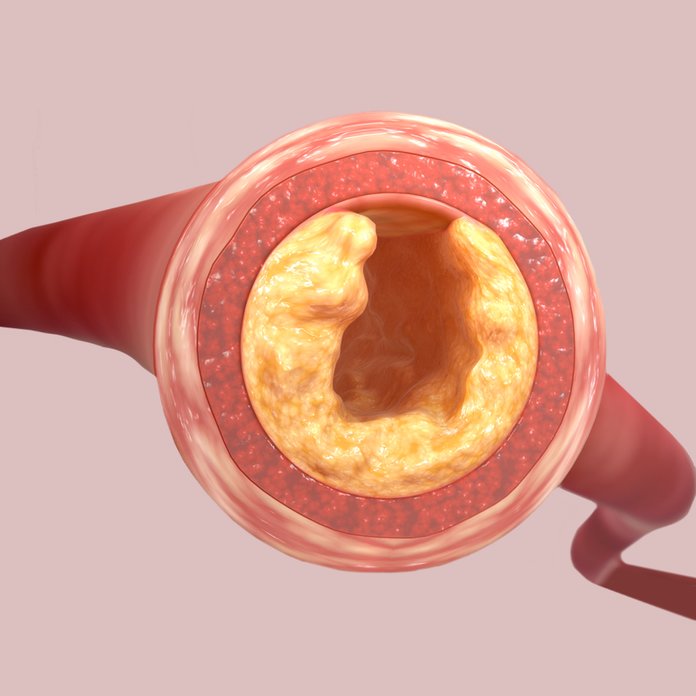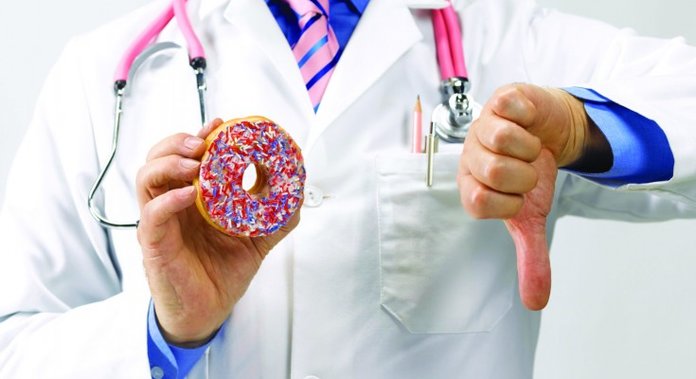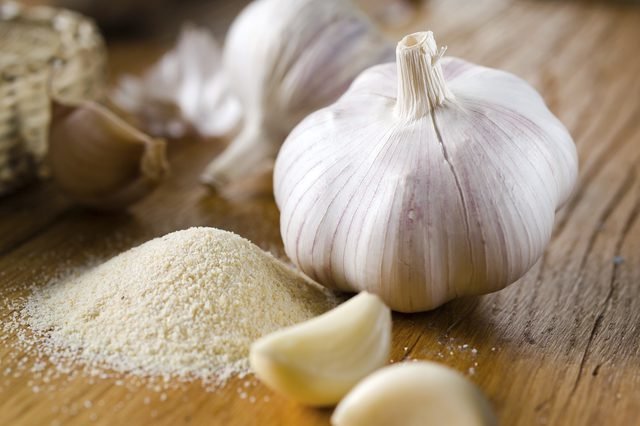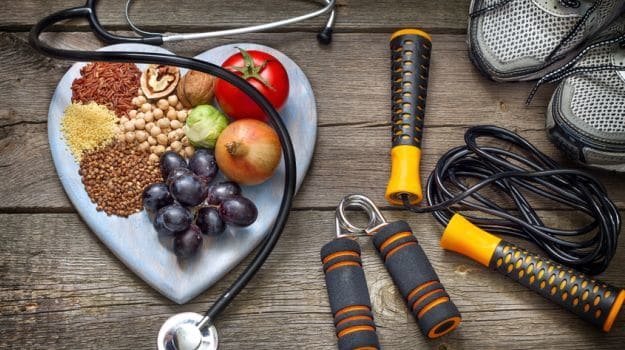Cardiologists and nutritionists do not stop the disputes for a long time and cannot come to a common denominator about what kind of blood cholesterol should be. And it turns out to be the most important factors affecting the change in cholesterol in the body are age, gender and heredity.
Interestingly, not all cholesterol "bad". It is necessary for the body to produce vitamin D3 and various hormones. Moreover, the body itself produces about three quarters, and only a quarter comes with food. But, if it can lead to the development of atherosclerosis and other diseases of the cardiovascular system.
Cholesterol is an organic compound that belongs to the lipid group. Contained in the plasma membrane cells of all living organisms. It is synthesized in various tissues, but most of all on the intestinal walls and in the liver. It is a waxy consistency that special protein connections are transported through the blood vessels.
Cholesterol is necessary for the body to perform a variety of vital processes:
- Serves as a "repair" material - cleans the arteries;
- Contributes to the synthesis of vitamin D, which converts food into energy;
- Stabilizes in the adrenal mines of cortisol, which is responsible for carbohydrate exchange;
- Helps in the process of digestion, helping the liver to allocate digestive juices and salts;
- Participates in the synthesis of sex hormones, such as estrogen, progesterone and testosterone.
Since a certain amount of cholesterol is necessary for the normal functioning of the body, specialists, focusing on the established counting standards, divide cholesterol into two categories - "bad" and "good".
Types of cholesterol
When the level of "good" cholesterol rises, it begins to accumulate on the walls of the vessels and turns into a "bad":
- "Good" cholesterol - It is a high density lipoprotein that removes extra cholesterol from the vascular wall, thereby cleans the arteries.
- "Bad" cholesterol - This is a low-density lipoprotein that forms plaques, which narrow the clearing of vessels, thereby disturbing the blood supply to organs.
If you do not take actions to reduce cholesterol, over time, the lumen of the vessels is clogged completely, thrombus and atherosclerosis are formed, which is the main cause of strokes and heart attacks.
Experts share cholesterol in the ratio of protein and fat:
- LDL. - Lipoprotein of low density, refers to "bad" cholesterol. It leads to the formation of accumulation of plaques on the walls of the arteries and increases the risk of developing cardiovascular diseases.
- LDP. - High density lipoprotein, refers to "good" cholesterol. Cleans the body from "bad" cholesterol. Low level of good cholesterol, also leads to problems with the cardiovascular system.
- LPONP - Lipoprotein of very low density. It is similar to low density lipoprotein - in fact does not contain protein and consists of fats.
- Triglyceride - This is another type of fat, which is also in the blood. It is part of the LPONP. Excess calories, alcohol or sugar turns into triglycerides and accumulates in body fat cells.
Blood cholesterol

Most professionals believe that cholesterol should be no more than 5.1 mmol / l. If the liver works fine, the level of this indicator can be adjusted independently. If the value is exceeded, it can, exclude some food from the diet, since cholesterol is contained in animal products.
Specialists have the norm for each cholesterol indicator. Its excess leads to health problems, and sometimes serious fatal diseases.
During the examination, the concept is used as a "atherogenicity coefficient", which is equal to the attitude of all cholesterols, except HDL to itself. In other words, the ratio of "bad" cholesterol to "good".
It is calculated by the formula: ka \u003d (total xs - HDL) / HDL.
In the results of the tests, this indicator should not exceed 3. If it reaches 4 means the process of accumulating atherosclerotic plaques.
Factors increasing blood cholesterol:
- Pregnancy;
- Receiving oral contraceptives;
- Starvation;
- When blood is surrendered standing;
- Reception of steroid drugs;
- Smoking;
- Consumption of oily food;
There are also factors that may affect the reduction of this indicator:
- Blood delivery in the lying position;
- Reception of antifungal drugs, statins and some hormonal drugs;
- Permanent sports or other physical exertion;
- Diet with a high content of polyunsaturated fatty acids.
As for the norm of general cholesterol, it is also different for men and women. Below are indicated common good biochemical indicators of blood in milligrams for deciliter:
- Common cholesterol< 200 мг/дл;
- Cholesterol LDL.< 160 мг/дл;
- Cholesterol HDP\u003e \u003d 40 mg / dl;
- Triglycerides< 150 мг/дл.
The norm of cholesterol in the blood in women is usually higher than that of men. But, poor cholesterol is less likely to postpone on the walls of vessels in women due to the features of protective reactions caused by sex hormones. Men are more susceptible to the development of the atherosclerosis of the vessels, starting from middle age.
Normal cholesterol for men:
| Age | Common cholesterol (mmol / l) | LDL (mmol / l) | HDP (mmol / l) |
| 20-25 | 3,16 — 5,59 | 1,71 — 3,81 | 0,78 — 1,63 |
| 30-35 | 3,57 — 6,58 | 2,02 — 4,79 | 0,72 — 1,63 |
| 40-45 | 3,91 — 6,94 | 2,25 — 4,82 | 0,70 — 1,73 |
| 50-55 | 4,09 — 7,71 | 2,31 — 5,10 | 0,72 — 1,63 |
| 60-65 | 4,12 — 7,15 | 2,15 — 5,44 | 0,78 — 1,91 |
| from 70 and older | 3,73 — 6,86 | 2,49 — 5,34 | 0,80 — 1,94 |
Normal cholesterol for women in mmol / l:
| Age | Common cholesterol (mmol / l) | LDL (mmol / l) | HDP (mmol / l) |
| 20-25 | 3,16 — 5,59 | 1,48 — 4,12 | 0,85 — 2,04 |
| 30-35 | 3,37 — 5,96 | 1,81 — 4,04 | 0,93 — 1,99 |
| 40-45 | 3,81 — 6,53 | 1,92 — 4,51 | 0,88 — 2,28 |
| 50-55 | 4,20 — 7,38 | 2,28 — 5,21 | 0,96 — 2,38 |
| 60-65 | 4,45- 7,69 | 2,59 — 5,80 | 0,98 — 2,38 |
| from 70 and older | 4,48 — 7,25 | 2,49 — 5,34 | 0,85 — 2,38 |
Some diseases can affect serious fluctuations in the level of total cholesterol, as well as climatic and weather changes. More often, the change in the indicators is affected by the cold season.
Causes of raising

After the twentieth age, doctors recommend paying attention to their lifestyle and try to keep track of blood cholesterol in order to take the necessary measures in a timely manner. The reasons for increasing cholesterol significantly a lot. Below are the main ones.
Food. Eating fat and harmful food increases cholesterol levels. Moreover, there is little, which is mentioned, but the formation of sediments of atherosclerotic plaques in the vessels begins with early childhood. They are represented by fat deposits in Aorte, which is denoted as fat stains. Later, in a publial period, such spots appear already in coronary arteries. Therefore, it follows from early childhood to keep up the nutrition.
It is noteworthy that in the countries of the Mediterranean, where seafood are common and are used in large quantities of vegetable products, the population suffers significantly from atherosclerosis and cardiovascular diseases.
Gender factor.Sexuality also has an impact on the enhancement of cholesterol. Up to sixty years are more susceptible to diseases associated with violation of lipid metabolism (violation of fats), men. In women, such a period comes after menopause. With reduced etrogen production, atherosclerosis of the brain vessels occurs.
Age factor.With age, the level of cholesterol in the blood is rising. This is due to the age-related changes in metabolism, reduction or impairment of the immune and endocrine system, age-related liver changes, which affect the operation of the circulatory system (coagulation). In people at the age of manifestations atherosclerosis, there are much more often found than young people or middle-aged people.
Genetic factor.The tendency to elevated cholesterol may be inherited. These genes can be "run" can be influenced by certain factors, such as life conditions and characteristic diet. If we take into account the tendency and follow nutrition, these genes can not "awaken" in general or to express themselves only at late age.
Extra weight problems.Weight problems are closely related to a violation of lipid and carbohydrate metabolism. Accordingly, cholesterol levels increase in blood and contributes to the development of vessel atherosclerosis. A large proportion of the population suffers from obesity in developed countries, which is associated with the rhythm of life, rapid food and stress.
Medical manipulations and reception of drugs.Often, operations associated with the urogenital system lead to an increase in cholesterol, for example, the removal of the ovary or kidney. Many drugs are also able to affect the level of its blood content - these are various diuretic drugs, hormonal, immigurating drugs, antiarrhythmic drugs, glucocorticosteroids, etc.
Bad habits.The next risk factor of atherosclerosis (blockage of vessels by cholesterol plaques) is smoking and alcohol. Frequent reception of alcoholic and even low alcohol drinks, as well as smoking cause changes in the walls of the vessels.
Scientific research has been proven that a smoking person is 9 times higher than the risk of atherosclerosis, ischemic heart disease than non-smoking. If you fail against smoking and alcohol, cholesterol levels normally for one to two years.
Hydodine.A sedentary lifestyle contributes to the emergence of overflowing problems and the development of obesity. You can cope with this problem if you increase physical activity, such as evening walks, gymnastics or sports. They will help to establish metabolism, thereby reduce the content of "bad" cholesterol in the blood, which will eliminate the problems with pressure and weight.
Arterial hypertension.Arterial hypertension is a long increase in blood pressure. This is due to the weakening and permeability of the walls of the vessels. The inner shell of arteries grow, spasms and blood thickening begin. Of course, this directly affects the development of atherosclerosis.
Diabetes.The process of exchanging fats and carbohydrates is closely interrelated. In diabetes mellitus, a violation of carbohydrate exchange occurs, which entails changes and lipid metabolism. Diabetic has almost always increased cholesterol lipoproteins of low density, which leads to a faster development of atherosclerosis.
Permanent stress.Researchers found that emotional stress affects the increase in cholesterol. This comes from the fact that stress is an immediate response of the body on any dangerous or unpleasant situation. The body begins to produce adrenaline and norepinephrine, which causes a rapid heartbeat and, as a result, leads to the emission of glucose. At the same time, fatty acids also begin to stand out intensively. All this organism is trying to immediately use as a source of energy and, accordingly, the level of cholesterol in the blood increases. That is, staying in a state of constant stress leads to problems with the cardiovascular system.
The presence of chronic diseases.A malfunction failure in any of the systems affects lipid exchange. Therefore, there may be diseases associated with the endocrine system, diseases of the liver, kidneys and gallbladder, diseases of the pancreas, diabetes, diseases of the heart, etc.
How to determine cholesterol?
To achieve middle-aged, and men and women are advised to regularly monitor blood cholesterol. This requires to pass the blood test to the determination of cholesterol.
As well as all blood tests, this analysis is surrendered on an empty stomach. It is recommended to take it in the morning, as it should pass 10-12 hours without eating food and drinks. You can drink clean water. Two weeks before the planned test of tests, it is necessary to stop the reception of drugs affecting changes in cholesterol. Stress, psychological and physical exertion should also be avoided.
Analyzes are handed over either in the clinic or in a specialized paid laboratory. Venous blood test is taken in volume 5 ml. You can also use a special device that measures cholesterol at home. They are equipped with disposable test stripes.
It is mandatory to check blood cholesterol in the following groups of people:
- Men who have reached the forty years;
- Women after klimaks;
- Diabetics;
- Suffered heart attacks and strokes;
- Having overweight problems;
- Suffering from bad habits.
Indicate the presence of elevated cholesterol, the level of thyroid hormone is a free thyroxine or coagulogram - a comprehensive analysis of blood coagulation.

In order to reduce the level of cholesterol in the blood, and in general, improve blood circulation, clean the arteries, thereby improve the quality of life and well-being, you can contact the traditional medicine.
Healers recommend diversifying their diet with products containing useful fatty acids omega-3. It is worth paying attention to linseed oil and its seeds, as well as try more to eat seafood, especially fish of fatty varieties.
Fruits, vegetables, greens, bran and green tea will help clean the body from "bad" cholesterol.
There is a huge number of recipes that effectively reduce blood cholesterol.
According to the recipe of Academician Boris Bolotova
Academician Boris Bolotov is famous for its works on the extension of youth and longevity based on the use of various medicinal herbs. One of these recipes will be submitted below. For preparation, we need the following ingredients:
- 50 grams of dry raw materials of the yardiness;
- 3 liters of boiled water;
- 200 grams of sugar;
- 10 grams 5% sour cream.
The grass in the gauze bag is poured boiling water and give to cool. Then add sugar and sour cream. Warm place is given in two weeks. At the same time, every day is stirred. Kvass take half an hour before the meal of 150 gr.
A feature is that after consuming the portion of kvass, the tank is tank as much water with a teaspoon of sugar dissolved in it. The course is designed for a month.
Recipe of Tibetan Lamas Cleansing Vessels Garlic
We got this ancient recipe from Tibetan Lam, which was transmitted from generation to generation. Preparation will not require special efforts. For this we need:
- 350 gr garlic;
- 200 ml of medical 96% alcohol.
Clear and crushed garlic in Cashitz. Leave for a while in a bank under the lid until the juice starts. Press the resulting juice so that it turned out 200 grams and add alcohol into it. Let it be in a cool place under a tightly closed lid for 10 days. It is possible to stretch over the linen rag and leave for 3 days.
According to the scheme, add 3 times a day by adding in 50 ml of cold boiled milk
half an hour before meals. Watering with water in an amount of 150 ml. The course is designed for 3 months. The re-course is carried out after 3 years.
Treatment scheme
| Days | (Capper) Breakfast | (Capper) Lunch | (Capper) dinner |
| 1 | 1 | 2 | 3 |
| 2 | 4 | 5 | 6 |
| 3 | 7 | 8 | 9 |
| 4 | 10 | 11 | 12 |
| 5 | 13 | 14 | 15 |
| 6 | 17 | 16 | 17 |
| 7 | 18 | 19 | 20 |
| 8 | 21 | 22 | 23 |
| 9 | 24 | 25 | 25 |
| 10 | 25 | 25 | 25 |
Licorice to lower cholesterol
The licorice root is often used in various healing drugs in alternative medicine. In order to prepare a decoction based on it, you should prepare:
- 40 g of licorice;
- 0.5 liters of water.
Dry licorice roots crush. Pour boiling water and peel 15 minutes on low heat. Take 70 gr after eating for 21 days. Then take a break for a month and repeat the course of treatment.
In addition to folk remedies, drug drugs can be used, but only after the examination and appointments of the doctor. Statins, fibrates, sequestrant bilic acids and omega-3.6 are usually assigned.
Prevention

- Reduce the consumption of saturated fats;
- Consume mono-saturated fats - olive oil, avocado, canola oil and peanut butter;
- Do not eat eggs in large quantities;
- Include in the diet of all sorts of legumes;
- Do sport;
- Consume more fresh vegetables and fruits;
- Include oat and rice bran in meals;
- Trying to eat low-fat meat, for example, beef;
- Eat more garlic;
- Reduce the consumption of coffee and alcohol;
- Do not smoke;
- Not exposed to excessive load and stress;
- Consumption in sufficient vitamins C and E, as well as calcium;
- Spirulina is also a beautiful fighter against "bad" cholesterol;
Check the level of cholesterol in the blood in a timely manner in order to avoid health problems, including with the cardiovascular system.
Materials posted on this page are informational and are intended for educational purposes. Website visitors should not use them as medical recommendations. Determination of the diagnosis and the choice of treatment technique remains an exceptional prerogative of your attending physician! The company is not responsible for the possible negative consequences resulting from the use of information posted on the site website.






